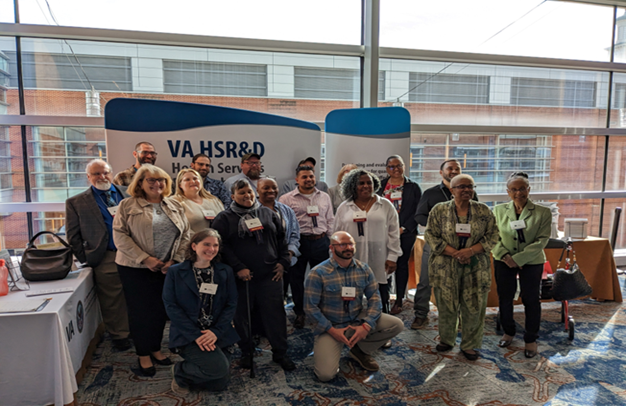Engaging Veterans and their caregivers in the design, conduct and dissemination of VA research has emerged as a powerful way to improve research and to build Veterans’ trust in VA. Since 2015 the national Veteran Engagement Workgroup (VEW) has worked to foster meaningful collaborations between Veterans and VA researchers. The goal of the group is to ensure that Veterans help shape VA research and make it more Veteran centric. Below is a summary of the group’s progress as well as key resources developed by VEW to improve the VA research infrastructure.
Veteran Engagement (VE) involves active and meaningful collaboration between Veterans and researchers across all stages of the research process, where Veterans’ experiences, values, and expertise guide research decision making. This concept of partnered research is in alignment with the goals of a learning health system which turns the experience of caring for patients into insights and improves and accelerates the uptake of research innovations and discoveries in clinical practice.
There are many ways that VA researchers can partner with Veterans and their caregivers. This spectrum of VE in research varies in both purpose and intensity. Researchers could consult with Veteran Engagement Groups (VEGs) at a Center of Innovation (COIN) or Consortia of Research (CORE), create their own project-based VEG, or include Veterans on their research team. Here are some resources to help navigate this process:
The VA strives to be a Veteran-centered health care system, which includes ensuring that VA-funded research reflects the needs and perspectives of Veterans. The concept of “patient-centered research” goes back decades, but since 2015 the Health Systems Research (HSR) division of the Office of Research and Development (ORD) has expanded efforts to include the engagement of Veterans and their caregivers in the research process.
The increased academic interest in patient engagement in the health research process led HSR to establish a national workgroup on Veteran Engagement (VEW) in 2015. This workgroup is comprised of investigators, Co-investigators, Veteran Engagement Group (VEG) liaisons, Veterans, and caregivers representing HSR nationally.
VEW has outlined approaches for local Veteran engagement initiatives and developed goals for promoting Veteran engagement in research nationally. In 2015 VEW completed an environmental scan of the then current progress in local Veteran engagement efforts, VE at the project level, and research in Health Experience Research (HER). This was coupled with an HSR specific VE conceptual model (Veteran Engagement in Health Services Research: a Conceptual Model | SpringerLink).
See Engaging Veterans in Research and Veteran and Caregive Engagement Report.
VEW and HSR efforts led to a substantial growth in VE activities. VE Plans are now required in HSR research proposals and Veteran Engagement Groups (VEGs) are a ubiquitous part of Centers of Innovation (COIN) and COnsortia of Research (CORE) activities.
VA’s scale of work has created opportunities to contribute to the science of engagement—that is, the systematic study of methods for and outcomes of engagement to inform high-quality, patient-centered health research. Much of this burgeoning knowledge about the benefits, frameworks, and models for how to engage Veterans is based on more applied and experiential descriptions of engagement. Recent HSR VE SWIFT funding will support research to expand and examine the effectiveness of different approaches to encourage VE in VA research.
Here are some activities the VEW is involved in:
Veteran participants in 2023 VA HSR National Meeting
